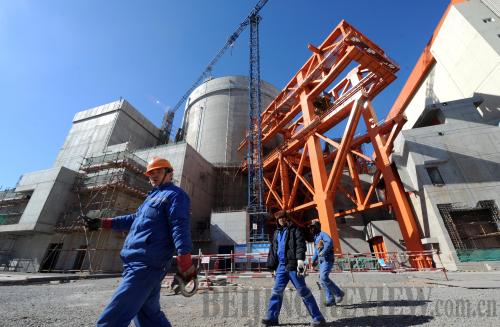Nuclear Power to Continue
Beijing Review, April 2, 2013 Adjust font size:
Nuclear power is a good choice for clean energy, but China must ensure its safe use
 |
|
Workers pass by the Hongyanhe Nuclear Power Station—the second unit of which is under construction—in northeast China's Liaoning Province. |
The first unit of the Hongyanhe Nuclear Power Station in Dalian, Liaoning Province began operation at 3:09 PM on February 17. It's the first nuclear power plant in northeast China, and the first nuclear power project to install nuclear fuels in China since Japan's Fukushima crisis in March 2011.
"The Fukushima nuclear accident had an adverse impact on the development of China's nuclear power, slowing down the pace of its development," Zhu Zhiyuan, Executive Vice President of the Chinese Academy of Sciences Shanghai Branch and Vice President of the Chinese Nuclear Physics Society, told Beijing Review.
According to Zhu, China suspended all its nuclear power projects under construction to improve safety following the Fukushima disaster. The State Council approved the resumption of nuclear power plant construction in October 2012 along the coast but not in its inland regions.
The three inland nuclear power projects in Taohuajiang in Hunan Province, Dafan in Hubei Province and Pengze in Jiangxi Province have been suspended. "It's mainly because of safety concerns," Qin Hongsan, General Manager of Jiangxi Electric Power Corp., told Beijing Review.
"This indicates the government is more than prudent in the development of nuclear power. It is very clear that the government puts safety first," Zhu said.
But not all agree that developing nuclear energy in China's interior should be suspended.
On March 4 before the opening of the First Session of the 12th National People's Congress, the Hunan delegation decided at a group conference to propose to the session that construction of nuclear power projects in inland areas should be resumed as soon as possible, and the Taohuajiang Nuclear Power Station should be listed as the first model.
"Nuclear power is clean energy. In Hunan, nuclear power can make up for the shortage of energy supplies," said Huang Boyun, Vice President of the China Association for Science and Technology.
An urgent need
Gradually reducing nuclear power is a trend in many developed countries. Three months after the Fukushima nuclear accident, the German Bundestag passed a series of bills, ending the use of nuclear power by 2022. France decided to cut its proportion of nuclear power from 75 percent to 50 percent by 2025.
"China is a vast country with a large population and has a huge demand for nuclear power. Therefore it is unlikely for China to blindly follow other countries; one or a few kinds of energy cannot satisfy the demand for China's economic development and the improvement of people's lives," said Zhu, who received a doctorate from the Technical University of Munich.
Today, nuclear power only accounts for 1.8 percent of China's total energy supplies, and 17 nuclear power plants are in operation. "Almost all the world's developed industrial countries, such as the United States, France, South Korea and Japan, have a large proportion of nuclear power in their energy mix," said Zhu. "Even in Germany, experts hold differing views on whether to shut down all their nuclear power plants."
Sun Qin, President of China National Nuclear Corp. (CNNC), says that no carbon dioxide, sulfur dioxide or nitrogen dioxide is emitted when generating nuclear power. "If China only uses nuclear power, the frequency of hazy days will definitely be reduced," Sun said.
Huang holds the same view.
"China is such a large country that it needs a huge amount of energy to reach its goal of building a moderately prosperous society. Fossil fuels will be used up one day, therefore we need more types of energy," he said.
In his native Hunan, energy is in short supply, and only hydropower and thermal power are offered. "Hunan lacks coal reserves and all the coal it needs is transported from Inner Mongolia Autonomous Region. Once the coal supplies are tight, the province will suffer power cuts. Moreover, thermal power also brings pollution," Huang said. With good geological conditions and the small possibility of tsunamis and earthquakes, Hunan is suitable for developing nuclear power, he says.


